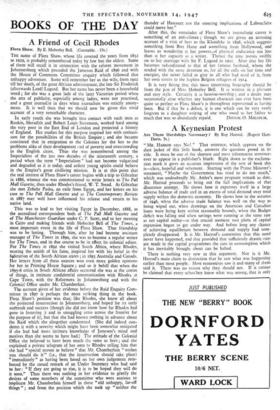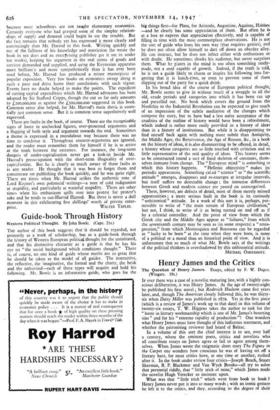• A Keynesian Protest
" MR. HARROD says No! " That sentence, which appears on the dust jacket of this little book, answers the question posed in its title. It must be one of the shortest and most informative sentences ever to appear in a publisher's blurb. Right down to the exclama- tion mark it gives an accurate impression of the sort of book this is—clear, hopeful and vehement. Starting with the Prime Minister's statement, " Maybe the Government has tried to do too much," which was undoubtedly Mr. Attlee's most pregnant remark to date, Mr. Harrod proceeds to bring out the full implications of that disastrous attempt. He shows how it expresses itself in a large adverse balance of trade and in an excess of total demand over total supply within the domestic economy. He shows how in the autumn of 1946, when the adverse trade balance was well on the way to being wiped out, when drawings on the American and Canadian loans were being kept within reasonable bounds, when the Budget deficit was falling and when savings were running at the same rate as net capital outlay—at that crucial moment vast plans of capital expansion began to get under way. And before long any chance of achieving equilibrium between demand and supply had com- pletely disappeared. It is Mr. Harrod's contention that this need never have happened, and that provided that sufficiently drastic cuts are made in the capital programmes the cuts in consumption which it has inevitably brought about can be halted.
There is nothing very new in this argument. Nor is it Mr. Harrod's main claim to distinction that he saw what was happening earlier than most people. Most economists saw it and many of them said it. There was no reason why they should not. If it cannot be claimed that every schoo:boy knew what was wrong, that is only because most schoolboys are not taught elementary economics. Certainly everyone who had grasped some of the simpler relation- ships of supply and demand could begin 'to see the trouble. But the fact remains that nobody yet has expressed it more clearly and convincingly than Mr. Harrod in this book. Writing quickly and out of the fullness of his knowledge and conviction (he wrote the book in ten days and an enterprising publisher got it out in under ten weeks), keeping his argument in the real terms of goods and services demanded and supplied, and using the Keynesian apparatus more brilliantly and more sympathetically than it has ever been used before, Mr. Harrod has produced a minor masterpiece of popular exposition. Very few books on economics sweep along at such a pace and drive home their conclusions with such vigour. Events have no doubt helped to make the points. The expedient of cutting capital expenditure which Mr. Harrod advocates has been adopted by Sir Stafford Cripps, though the-cut so far only amounts to £2o0,000,000 as against the L500,000,000 suggested in this book. Common sense also helped, for Mr. Harrod's main thesis is essen- tially just common sense. But it is common sense superlatively well expressed.
There are faults in the book, of course. There are the recognisable signs of haste in unchecked figures, over-protested arguments and a flagging of both style and argument towards the end. Sometimes a theme is expressed in a roundabout way because there was no time to condense it. Throughout counter-arguments are ignored, and the reader must remember them for himself if he is to arrive at the truth between the extremes. For instance, the long-term dangers of under-capitalisation never get a look-in beside Mr. Harrod's preoccupation with the short-term illogicality of over- capitaisation. But he is clearly as much aware of these faults as is any reader. He thought that it was best to forget them and concentrate on publishing the book quickly, and he was quite right. There are times when Mr. Harrod strikes the authentic note of Lord Keynes's own polemical -writings—a note of cold indignation at stupidity, and particularly at wasteful stupidity. There are other- times when his enthusiasm spills over into protest for protest's sake and he tends to out-Harrod Harrod. But there is never a dull moment in this exhilarating five shillings' worth of private enter-































 Previous page
Previous page